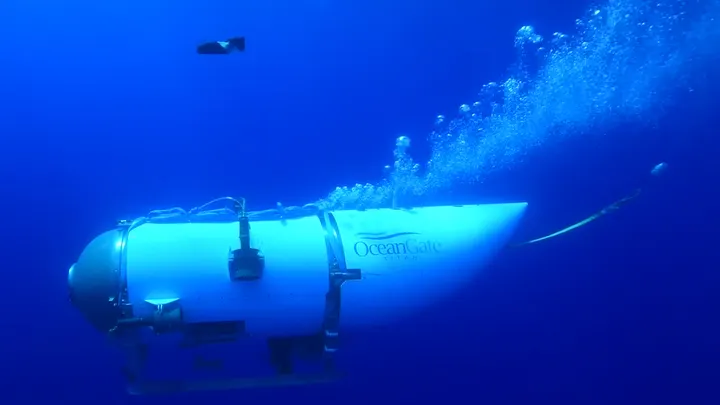A psychologist has sounded the alarm that social media is causing children to lose empathy amid the OceanGate tragedy

A cultural expert and psychologist worry about a decline in empathy among the American public, and it’s not clearly explained amid hateful comments online against victims of the exploding submersible on its journey to view the wreckage of the Titanic.
Recovery efforts for the Titan submersible continue with the help of a remotely operated vehicle
Titan Submersible Oceangate, charging tourists $250,000 each, is operated by an inexpensive video game controller, its CEO revealed in a video interview last year. OceanGate’s Titan explodes, killing five of its passengers; Its debris field was found 1,600 feet from the wreck of the Titanic.
The victims were Suleiman Dawood, Shahzada Dawood, Stockton Rush, Paul-Henri Nargolet, and Hamish Harding. Harding, a British millionaire, was known for his international exploration escapades.
During the ongoing search, hateful and derisive comments flooded the internet. The phrase “eat the rich” has become a common concept expressed by some people.
A Reddit thread asked the question, “Why is it so hard to empathize with rich people who perish on a submersible?” Meanwhile, Instagram, TikTok, and other platforms were awash with memes and jokes comparing the situation to the Titanic and mocking the carelessness of the submersible’s passengers.
Clinical psychologist Michelle Solomon points to the lack of empathy prevalent in today’s culture, attributing some of the responsibility to social media companies. She notes that these tech giants have created platforms with an emphasis on fast scrolling, user engagement, and time spent online rather than meaningful interactions.

Solomon expressed concern about the implications for younger generations who spend more time online, as they will shape the future of society. She specifically mentioned features like “fast-scrolling,” which involves rapidly rotating recommended content such as reels, videos, and images to suit user tastes, and described it as a recipe for potential disaster.
“When you engage in fast scrolling on social media, even if you have good intentions, you detach yourself from your emotions and your empathetic subject,” she notes. “By scrolling quickly without taking time to process the content, you may find something momentarily interesting, quickly moving on to the next item without really understanding or recognizing its significance.”
She continued, “These daily scrolling habits that we all engage in, we need to think about the impact they have on our ability to connect with one another.”
The psychologist further explains why she believes this story is so compelling.
“It’s one of those times where people feel like they’re watching a movie. They’re eager to see what happens, hoping for a resolution that brings about a happy ending. Unfortunately, that’s not the case.” Solomon said.
She added that it triggers a fight-or-flight response in some people, especially those who experience anxiety and persistent anxiety.
“Those hesitant to take risks or step outside their comfort zones will find this story particularly interesting,” she commented. “Still, it’s important to remind people that in any endeavor, there’s always the possibility of something unfortunate happening. However, that shouldn’t stop them from taking risks or engaging in exciting opportunities. This incident was just a tragic incident.”
Solomon emphasized that people have different thresholds for risk, highlighting the importance of personal growth while maintaining safety precautions.
“When you’re pursuing personal growth or venturing beyond your comfort zone, it’s important because it builds character and confidence,” she explains. “It is essential to assess safety measures, ensuring that all necessary precautions are taken for a successful outcome. Following that, one should give it a go and try.”


